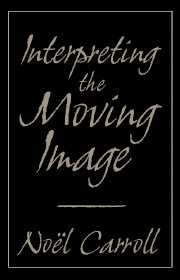Book contents
- Frontmatter
- Contents
- Foreword: Through Carroll's Looking Glass of Criticism
- Introduction
- 1 The Cabinet of Dr. Kracauer
- 2 Entr'acte, Paris and Dada
- 3 The Gold Rush
- 4 Keaton: Film Acting as Action
- 5 Buster Keaton, The General, and Visible Intelligibility
- 6 For God and Country
- 7 Lang, Pabst, and Sound
- 8 Notes on Dreyer's Vampyr
- 9 King Kong: Ape and Essence
- 10 Becky Sharp Takes Over
- 11 Interpreting Citizen Kane
- 12 The Moral Ecology of Melodrama: The Family Plot and Magnificent Obsession
- 13 Mind, Medium, and Metaphor in Harry Smith's Heaven and Earth Magic
- 14 Welles and Kafka
- 15 Nothing But a Man and The Cool World
- 16 Identity and Difference: From Ritual Symbolism to Condensation in Anger's Inauguration of the Pleasure Dome
- 17 Text of Light
- 18 Joan Jonas: Making the Image Visible
- 19 Introduction to Journeys from Berlin/1971
- 20 The Future of Allusion: Hollywood in the Seventies (and Beyond)
- 21 Back to Basics
- 22 Amy Taubin's Bag
- 23 Herzog, Presence, and Paradox
- 24 Film in the Age of Postmodernism
- Notes
- Index
16 - Identity and Difference: From Ritual Symbolism to Condensation in Anger's Inauguration of the Pleasure Dome
Published online by Cambridge University Press: 05 June 2012
- Frontmatter
- Contents
- Foreword: Through Carroll's Looking Glass of Criticism
- Introduction
- 1 The Cabinet of Dr. Kracauer
- 2 Entr'acte, Paris and Dada
- 3 The Gold Rush
- 4 Keaton: Film Acting as Action
- 5 Buster Keaton, The General, and Visible Intelligibility
- 6 For God and Country
- 7 Lang, Pabst, and Sound
- 8 Notes on Dreyer's Vampyr
- 9 King Kong: Ape and Essence
- 10 Becky Sharp Takes Over
- 11 Interpreting Citizen Kane
- 12 The Moral Ecology of Melodrama: The Family Plot and Magnificent Obsession
- 13 Mind, Medium, and Metaphor in Harry Smith's Heaven and Earth Magic
- 14 Welles and Kafka
- 15 Nothing But a Man and The Cool World
- 16 Identity and Difference: From Ritual Symbolism to Condensation in Anger's Inauguration of the Pleasure Dome
- 17 Text of Light
- 18 Joan Jonas: Making the Image Visible
- 19 Introduction to Journeys from Berlin/1971
- 20 The Future of Allusion: Hollywood in the Seventies (and Beyond)
- 21 Back to Basics
- 22 Amy Taubin's Bag
- 23 Herzog, Presence, and Paradox
- 24 Film in the Age of Postmodernism
- Notes
- Index
Summary
Though we are quite willing to approach commercial, narrative films as reflections of cultural themes that dominate the milieu of their making, we tend to treat avant-garde works differently – i.e., apart from their social and historical contexts (as one might, for example, treat certain philosophical positions). The initial reason for this is understandable. Since the perspective that a new avant-garde film presupposes, illustrates, or alludes to is one that many of its viewers either inhabit or are coming to share, they do not readily see it as a particular perspective bound to a specific place and time. Yet, in retrospect, we can note sharp correspondences between the projects of the New American Cinema and preoccupations pervasive in surrounding cultural and intellectual neighborhoods.
For example, Brakhage's concern with “alternate” aspects of perception accrued special significance during a decade in which, from acid to anthropology, a great debate about the validity of different modes of experience (and living) rocked American social institutions. The formal articulation of the theme of presence in Brakhage likewise correlates with the emphasis on the lived moment – on the intensification and enrichment of experience – that was a rallying cry in the 60s and early 70s. Part of the importance of Brakhage's untiring effort, looked at through the optic of history, is his creation of symbol systems that served as emblems expressive of vital issues and interests in the culture from which they emerged.
- Type
- Chapter
- Information
- Interpreting the Moving Image , pp. 214 - 224Publisher: Cambridge University PressPrint publication year: 1998



